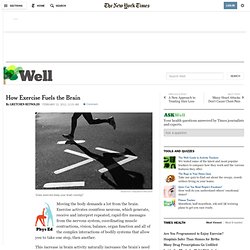

Twelve Things You Were Not Taught in School About Creative Thinking. Synopsis Aspects of creative thinking that are not usually taught. 1. . The artist is not a special person, each one of us is a special kind of artist. Every one of us is born a creative, spontaneous thinker. The only difference between people who are creative and people who are not is a simple belief. You must have passion and the determination to immerse yourself in the process of creating new and different ideas. 3. 4. 5. 6. 7. How Exercise Fuels the Brain. Shannon Stapleton/ReutersDoes exercise keep your brain running?

Moving the body demands a lot from the brain. Exercise activates countless neurons, which generate, receive and interpret repeated, rapid-fire messages from the nervous system, coordinating muscle contractions, vision, balance, organ function and all of the complex interactions of bodily systems that allow you to take one step, then another. This increase in brain activity naturally increases the brain’s need for nutrients, but until recently, scientists hadn’t fully understood how neurons fuel themselves during exercise. Now a series of animal studies from Japan suggest that the exercising brain has unique methods of keeping itself fueled. What’s more, the finely honed energy balance that occurs in the brain appears to have implications not only for how well the brain functions during exercise, but also for how well our thinking and memory work the rest of the time. That’s where the Japanese researchers came in. Study: Hugs, Encouragement Help Kids' Brains Grow - Early Years.
Seven misconceptions about how students learn - The Answer Sheet. Posted at 04:00 AM ET, 02/14/2012 Feb 14, 2012 09:00 AM EST TheWashingtonPost Will Rogers once said, “It isn’t what people don’t know that hurts them.

It’s what they do know that just ain’t so.” That’s the introduction to a list of seven myths about learning on the Web site of the Independent Curriculum Group, which is part of a movement of leading private college preparatory schools with teacher-generated curriculum. Many people — educators included — still cling to some of these misconceptions about learning because they base what they think on their own experiences in school, ignoring what 21st century science and experience are revealing. Here are seven of the biggest myths about learning that, unfortunately, guide the way that many schools are organized in this era of standardized test-based public school reform. Basic Facts Come Before Deep Learning This one translates roughly as, “Students must do the boring stuff before they can do the interesting stuff.” Covering It Means Teaching It.